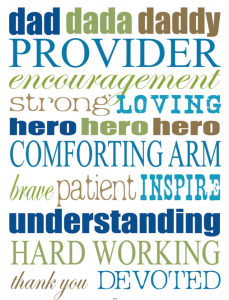Listen to this inspiring talk by Bishop Fulton J. Sheen about the importance of adoration.
 One day about 20 years ago, I needed to have a court order signed by one of the judges at the Peoria County Courthouse. I walked over to the courthouse from my downtown office. When I entered the courtroom, the only people present were the judge and a local area attorney. As soon as I walked up to the judge to ask him to sign the order, he said, “Where’s your jacket?”
One day about 20 years ago, I needed to have a court order signed by one of the judges at the Peoria County Courthouse. I walked over to the courthouse from my downtown office. When I entered the courtroom, the only people present were the judge and a local area attorney. As soon as I walked up to the judge to ask him to sign the order, he said, “Where’s your jacket?”
 I periodically encounter a devout Catholic who is struggling with emotional issues that are causing him or her to experience significant suffering. After a short discussion about what’s troubling the person, I always ask the exact same question: Do you pray your rosary every day? The answer is always ‘no.’ Always.
I periodically encounter a devout Catholic who is struggling with emotional issues that are causing him or her to experience significant suffering. After a short discussion about what’s troubling the person, I always ask the exact same question: Do you pray your rosary every day? The answer is always ‘no.’ Always.
 One of my greatest challenges is controlling the way that I talk to myself. Whether we realize it or not, most of the talking we do is to ourselves. We’re experts at getting ourselves worked up over a situation, generating self-righteous indignation toward others, and convincing ourselves that we’re right and others are wrong.
One of my greatest challenges is controlling the way that I talk to myself. Whether we realize it or not, most of the talking we do is to ourselves. We’re experts at getting ourselves worked up over a situation, generating self-righteous indignation toward others, and convincing ourselves that we’re right and others are wrong.
 Last week, I reread two documents: the U.S. Constitution, which was written more than 200 years ago, and The Communist Manifesto, which was written more than 150 years ago. James Madison and the other authors of the Constitution were primarily concerned with guaranteeing the freedom and liberty of all Americans by placing severe limitations on the power of the federal government. Karl Marx, the author of The Communist Manifesto, mapped out what would become a blueprint for dictators whose primary aim was to achieve power by exercising complete control over the lives of their citizens.
Last week, I reread two documents: the U.S. Constitution, which was written more than 200 years ago, and The Communist Manifesto, which was written more than 150 years ago. James Madison and the other authors of the Constitution were primarily concerned with guaranteeing the freedom and liberty of all Americans by placing severe limitations on the power of the federal government. Karl Marx, the author of The Communist Manifesto, mapped out what would become a blueprint for dictators whose primary aim was to achieve power by exercising complete control over the lives of their citizens.
 I graduated from high school in May 1975 and began my freshman year at college in August of that same year. During the fall semester, the gay rights activists on campus set aside a day that they designated as “Gay Day.” They put an announcement in the school newspaper that on Gay Day, anyone who was in support of gay rights should show their support by wearing jeans to class. At that time, there were over 20,000 students attending classes at the university, and approximately 80 percent of them wore jeans to class every day.
I graduated from high school in May 1975 and began my freshman year at college in August of that same year. During the fall semester, the gay rights activists on campus set aside a day that they designated as “Gay Day.” They put an announcement in the school newspaper that on Gay Day, anyone who was in support of gay rights should show their support by wearing jeans to class. At that time, there were over 20,000 students attending classes at the university, and approximately 80 percent of them wore jeans to class every day.
One of the most common emotions I see among clients is fear — fear concerning a job, a medical condition, a family member, a financial problem, a legal problem, the state of our economy, the state of our culture.
 During my first year in college (1975), I sent a telegram to my sister Colleen who was a senior in high school. She was in the school play and I wanted to get a written message to her wishing her luck on the opening night of the play. The message consisted of two short sentences and was delivered to her the same day that I sent it.
During my first year in college (1975), I sent a telegram to my sister Colleen who was a senior in high school. She was in the school play and I wanted to get a written message to her wishing her luck on the opening night of the play. The message consisted of two short sentences and was delivered to her the same day that I sent it.
 Earlier this month, the Administration for Children and Families (ACF), which is a division of the U.S. Department of Health and Human Services, announced an $800,000 grant that is designed “to disseminate information about good fatherhood parenting practices by building research and practice knowledge and capacity” and to “increase positive father involvement in the lives of their children.” (Reread what I just quoted and see if it makes any sense to you.)
Earlier this month, the Administration for Children and Families (ACF), which is a division of the U.S. Department of Health and Human Services, announced an $800,000 grant that is designed “to disseminate information about good fatherhood parenting practices by building research and practice knowledge and capacity” and to “increase positive father involvement in the lives of their children.” (Reread what I just quoted and see if it makes any sense to you.)
If you were to ask me to describe someone I’m familiar with, I would start by naming the person’s attributes. An attribute is defined as “an inherent characteristic” or “a word ascribing a quality.” For example, if you asked me to describe my dad (Carl Williams), I would respond by saying that he’s organized, practical, protective, by-the-book, private, efficient, productive, hardworking, trustworthy, skilled, confident, decisive, and strategic. My description of how I remember my grandfather (Tom Williams) would include the following attributes: bold, vigorous, genuine, intense, self-reliant, admired, dominant, forceful, trustworthy, confident, decisive, and independent.

